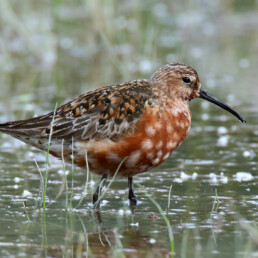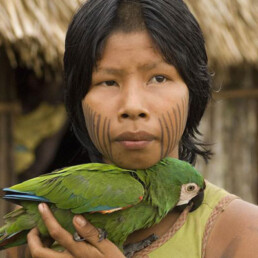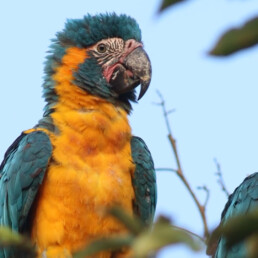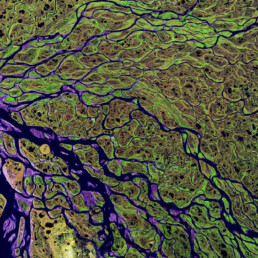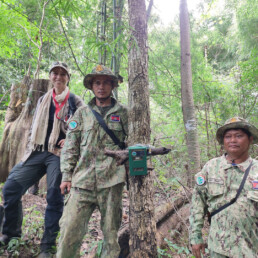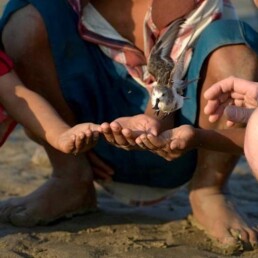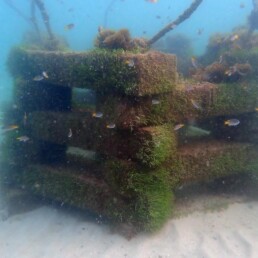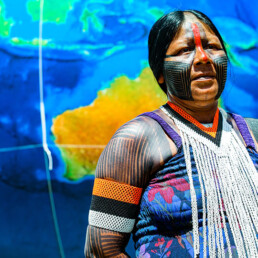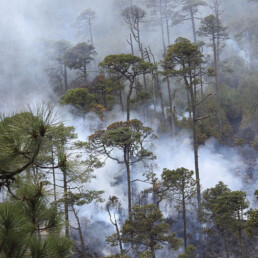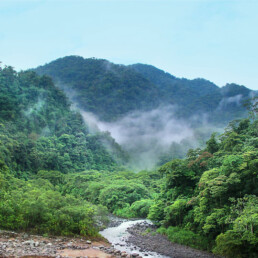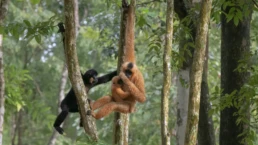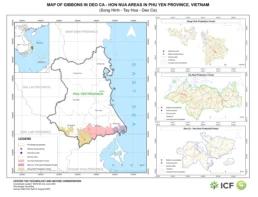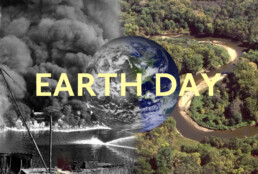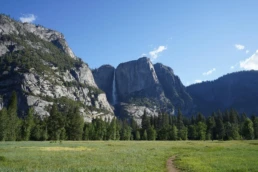A Critical Discovery Reveals Hope for Vietnam’s Endangered Primates
Recent field surveys in central Vietnam have confirmed that some of the country’s most threatened primates are still surviving in the wild — and in places where their presence had never before been officially documented.
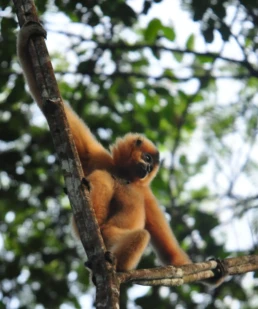
Within the contiguous forest complex of Deo Ca – Tay Hoa – Song Hinh, researchers confirmed six groups of Endangered Red-cheeked gibbons (Nomascus gabriellae), representing at least 15 individuals, and made a first-ever confirmed discovery of a group of Black-shanked douc langurs (Pygathrix nigripes) in Song Hinh Protection Forest. This finding marks the northernmost recorded distribution of the species to date.
Covering more than 154 kilometers of systematic transect surveys, the study documented primate presence primarily through early-morning vocalizations, along with feeding and resting signs concentrated in streamside and riparian habitats. These forests form a connected landscape of up to 130,000 hectares, recognized as both a Key Biodiversity Area (KBA) and an Alliance for Zero Extinction (AZE) site, underscoring their global ecological importance.
Despite this significance, the region faces persistent threats from hunting, habitat fragmentation, infrastructure development, and enforcement gaps — pressures that make these discoveries both hopeful and urgent.
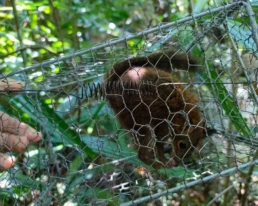
Local Leadership at the Core: CTNC’s Role on the Ground
These results are the outcome of a project led by the Center for Technology and Nature Conservation (CTNC), a Vietnam-based grassroots NGO working directly with local authorities and communities to protect the country’s remaining wildlife and habitats.
Through a combination of scientific field surveys, technology-based monitoring, and community engagement, CTNC has demonstrated how locally led conservation can deliver concrete, measurable outcomes in complex and challenging landscapes.
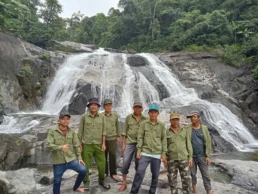
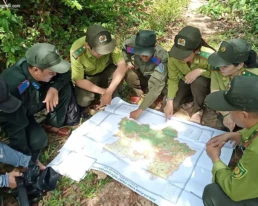
The People Protecting the Forest: Rangers, Data, and Daily Patrols
A central pillar of the project focused on improving forest protection by equipping rangers with modern monitoring tools. Between April and August 2025, CTNC conducted three SMART training courses across Deo Ca Special-use Forest, Tay Hoa Protection Forest, and Song Hinh Protection Forest, training a total of 67 forest protection staff.
The Forest Has Neighbors — and They Matter
Recognizing that conservation cannot succeed without public understanding and support, CTNC also invested in outreach and education.

Environmental education programs reached nearly 1,000 students and teachers across three secondary schools, many of whom were unaware that globally threatened primates and turtles lived in the forests surrounding their communities. At the same time, public awareness campaigns using commune loudspeaker systems reached over 10,000 local residents, delivering repeated messages on wildlife protection laws, ecological importance, and legal consequences of illegal hunting and trade.
For the first time, patrol data were systematically recorded with GPS tracks, time stamps, and standardized threat reporting — allowing forest managers to identify enforcement hotspots and respond more effectively.
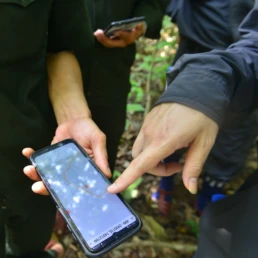
This effort moved quickly from training to real-world implementation. Following the handover of SMART-enabled mobile devices, patrol teams in Tay Hoa alone conducted:
21
patrols
46
patrol days
305.59
km covered
570
patrol hours logged
Why Local, Comprehensive Conservation Matters
Protecting Vietnam’s endangered primates is still possible — but only if these efforts are sustained and scaled. Support locally led conservation initiatives that combine science, enforcement, and community engagement to safeguard critical habitats before they are lost.
The achievements of this project — from species discoveries to improved enforcement and community engagement — were only possible because the work was led by people who understand the landscape, the species, the threats, and the social realities on the ground.
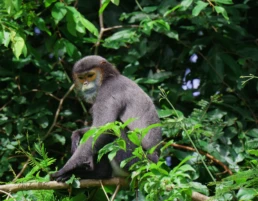
Photo by Tang A Pau
Effective conservation is not a single action or tool. It requires local expertise, scientific rigor, enforcement capacity, and community involvement, working together as a cohesive strategy. CTNC’s work in Phu Yen demonstrates what is possible when conservation is approached comprehensively and led by the right people in the field.
This Earth Day feels different
Dear Friends,
This Earth Day feels different.
Since the first Earth Day in 1970—which itself emerged from a wave of environmental disasters and rising public outrage—we’ve seen moments of progress, setbacks, and profound challenges. That first Earth Day was sparked by a series of shocking events: the Cuyahoga River catching fire in Ohio, the massive oil spill off Santa Barbara’s coast, and smog so thick in cities like Los Angeles that children couldn’t play outside. It was born from a crisis—just as we now find ourselves in another.
We are watching hard-won environmental protections of the past 50 years unravel. Political leadership that once championed science and sustainability is now accelerating destruction. And the climate crisis, once a distant warning, is here—flooding our cities, burning our forests, reshaping our world.
But perhaps the most unsettling part is this: it’s not just that we’re moving in the wrong direction. It’s that we’re losing the very mechanisms we need to find our way back. Trust in institutions. International cooperation. Shared truth.
And yet—despite it all—millions of people around the world are still fighting for the Earth.
In every region, on every continent, conservationists, scientists, Indigenous leaders, youth activists, and everyday citizens are protecting wild places, restoring broken ecosystems, and defending the future.
Their work is not always in the headlines. But it is unwavering. And it is full of hope.
At the International Conservation Fund, we draw strength from these stories. We believe in the power of resilience, in the quiet courage of those who refuse to give up, and in the deep, abiding truth that nature can recover—if we give it a chance.
So yes, this may be the darkest Earth Day since the first. But it does not have to stay that way.
Let us carry the torch through this dark age—together. Let us listen, learn, act, and give. Let us remind ourselves and each other that despair is not a strategy and that the future will be decided by what we choose to do now.
ICF funds cutting-edge conservation partners around the world, protecting some of the most endangered habitats and species against ever-increasing threats. Please take a moment to learn more about our Field Partners and consider making a donation to support their work.
This Earth Day, don’t turn away. Turn toward the work. Toward each other. Toward the Earth.
With resolve and hope,
International Conservation Fund
The U.S. Led the World in Conservation—We Can Do It Again
The United States has played a unique role in the history of conservation. At times, it has been seen as an obstacle to global environmental progress—resisting international climate agreements, rolling back protections, and allowing denial to stall urgent action. But just as often, it has led the world—pioneering national parks, shaping international treaties, and inspiring movements through art, activism, and philanthropy. American scientists have uncovered the dangers of pollution, American leaders have signed groundbreaking environmental laws, American philanthropists have funded conservation on a massive scale, and American citizens have marched, organized, and demanded change. Today, as we face new environmental challenges, it’s crucial to step back and see the bigger picture. History shows us that progress is possible—and that when Americans rise to the occasion, we don’t just change our country. We change the world.
“The battle for conservation must go on endlessly. It is part of the universal warfare between right and wrong.” - John Muir

John Muir and Theodore Roosevelt, two pioneers of American conservation, united in their vision to protect the natural beauty of the United States. (Credit: National Park Service)
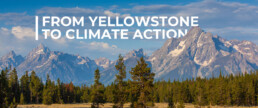
The story of American conservation began with a bold idea: that nature, in all its beauty and grandeur, should belong to the people and be preserved for future generations. In 1872, the United States created Yellowstone National Park, the first of its kind in the world. This revolutionary act not only safeguarded a vast and breathtaking landscape but also set a precedent for conservation efforts across the globe. It was the first step in a long journey—one that would lead to the establishment of national parks, wildlife refuges, and environmental protections that continue to shape the world today.
From the creation of the National Park Service in 1916 to the passage of the Clean Air and Clean Water Acts in the 1970s, the U.S. has been at the forefront of efforts to protect the environment. The fight to ban DDT, the success of the Montreal Protocol, and the global impact of Earth Day—first organized in the U.S. in 1970—are just a few milestones in a long history of environmental progress.
“We have fallen heirs to the most glorious heritage a people ever received, and each one must do his part if we wish to show that the nation is worthy of its good fortune.” - Theodore Roosevelt
"Clean air, clean water, open spaces - these should once again be the birthright of every American." - Richard M. Nixon
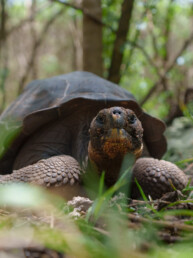
Yet, no single list could ever capture the full scope of these achievements, nor the countless individuals who have dedicated their lives to conservation. Scientists, activists, philanthropists, and everyday citizens—in the U.S. and around the world—have worked tirelessly to protect the planet, often against great odds. Their efforts, whether in the halls of government, the depths of the oceans, or the pages of a book, have shaped the way we understand and care for our natural world.
Today, our partners at Jocotoco are not only protecting existing wilderness but also achieving an ambitious goal: rewilding Floreana Island in the Galápagos. By restoring ecosystems and reversing 200 years of ecological damage, they are setting a powerful example of what conservation can accomplish.
Environmentalism is not bound by time or borders. The passion of one generation inspires the next, and the actions of individuals ripple outward, creating a force for change that stretches across continents. Just as Rachel Carson’s warnings about pesticides ignited a movement, just as American conservationists helped establish the first global environmental treaties, the work we do today will inspire those who come after us. The story of conservation is still being written—and we each have a role to play.
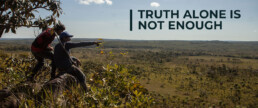
The pursuit of science and truth can create a false sense of optimism—the belief that because truth reflects reality, it will inevitably prevail. And in one sense, it will: climate change is not a matter of debate, but a fact that is already reshaping our world. But will truth prevail where it matters most—in the consciousness of people, in our institutions, in the decisions that shape the future? The fight against climate change has made it painfully clear that we cannot take this for granted.
Unprecedented wildfires tear through forests and communities. Drought strikes even the rainforests. Coral bleaching ravages fragile marine ecosystems. Species are vanishing at catastrophic rates, and entire ecosystems are being pushed to the brink of collapse. This is the painful and undeniable reality—yet half of Americans refuse to accept the science. They continue to vote for leaders who shape domestic and international policies based on denial and misinformation. Despite the tireless efforts of scientists, activists, journalists, and policymakers, climate denial remains deeply entrenched.
Environmental protection is, without question, one of the most urgent challenges facing humanity—but we are not confronting it as a united front. Instead, the fight for the planet is waged in countless, scattered battles: scientists racing to document vanishing species, activists working to reclaim their institutions, Indigenous communities defending their land and culture against destruction.
“The more clearly we can focus our attention on the wonders and realities of the universe about us, the less taste we shall have for destruction.” - Rachel Carson
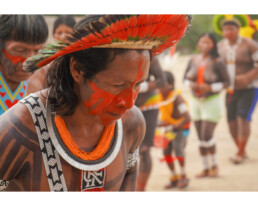
Kayapo Celebration (Credit: Takakrua Kayapo)
On the frontlines of deforestation, the Kayapo people are safeguarding over 9 million hectares of rainforest. Their decades-long success stands as proof of the power of Indigenous knowledge, sustained philanthropy, and strong institutions. Despite political challenges and external pressures, the Kayapó have remained resilient—demonstrating that sustained support and institution-building are key to long-term conservation.
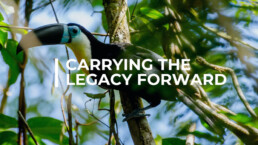
Even in times of division and isolationism, there is strength in connection. Across borders and disciplines, across movements and generations, we are part of a vast and interwoven network of people fighting for nature. In this web of defenders—scientists, advocates, land stewards, and educators—our power lies in learning from one another, supporting each other, and standing together. The work ahead will not be easy, but it is shared. And together, we can push forward.
Despite the challenges we face, there is good news: the network of individuals fighting for conservation is real, and it is stronger than ever. Across the globe, people have been building knowledge, protecting ecosystems, and defending biodiversity. Indigenous communities have not only safeguarded their lands but have also built institutions to ensure their voices are heard. Scientists and conservationists have spent decades exchanging knowledge, expanding our understanding of species and ecosystems, and developing solutions that will guide us forward.
In this era of political uncertainty and geopolitical instability, we must do everything in our power to maintain and strengthen these connections. Conservation has always been a collective effort, and the institutions that support it—whether scientific, governmental, or grassroots—are more important than ever. The International Conservation Fund is privileged to work alongside incredible partners around the world, many of whom face great challenges and uncertainty. But we remain committed to this work, to them, and to building upon the hard-won achievements of those who came before us.
There are thousands of conservation projects around the world that go unnoticed and millions of individuals holding invaluable knowledge and skills—each representing a piece of a puzzle we must solve together. The pieces fit; we just need to connect them, strengthen them, and ensure they endure. Take a moment to explore the partners that ICF supports. Learn about their projects, amplify their work, and contribute to conservation efforts that will leave a lasting impact—one that ripples across generations and ecosystems.
The future of conservation is still being written, and it is up to us to ensure that this legacy not only endures—but grows.

Fundación Atelopus with the Arhuaco Indigenous People, working together to protect biodiversity. (Credit: Fundación Atelopus)
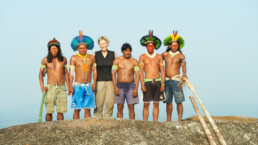
Barbara Zimmerman, side by side with the Kayapo guardians, safeguarding the Amazon. (Credit: Martin Schoeller)
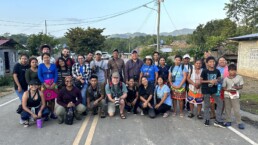
Scott Hecker together with our Indigenous Wounaan partners in Panama.

